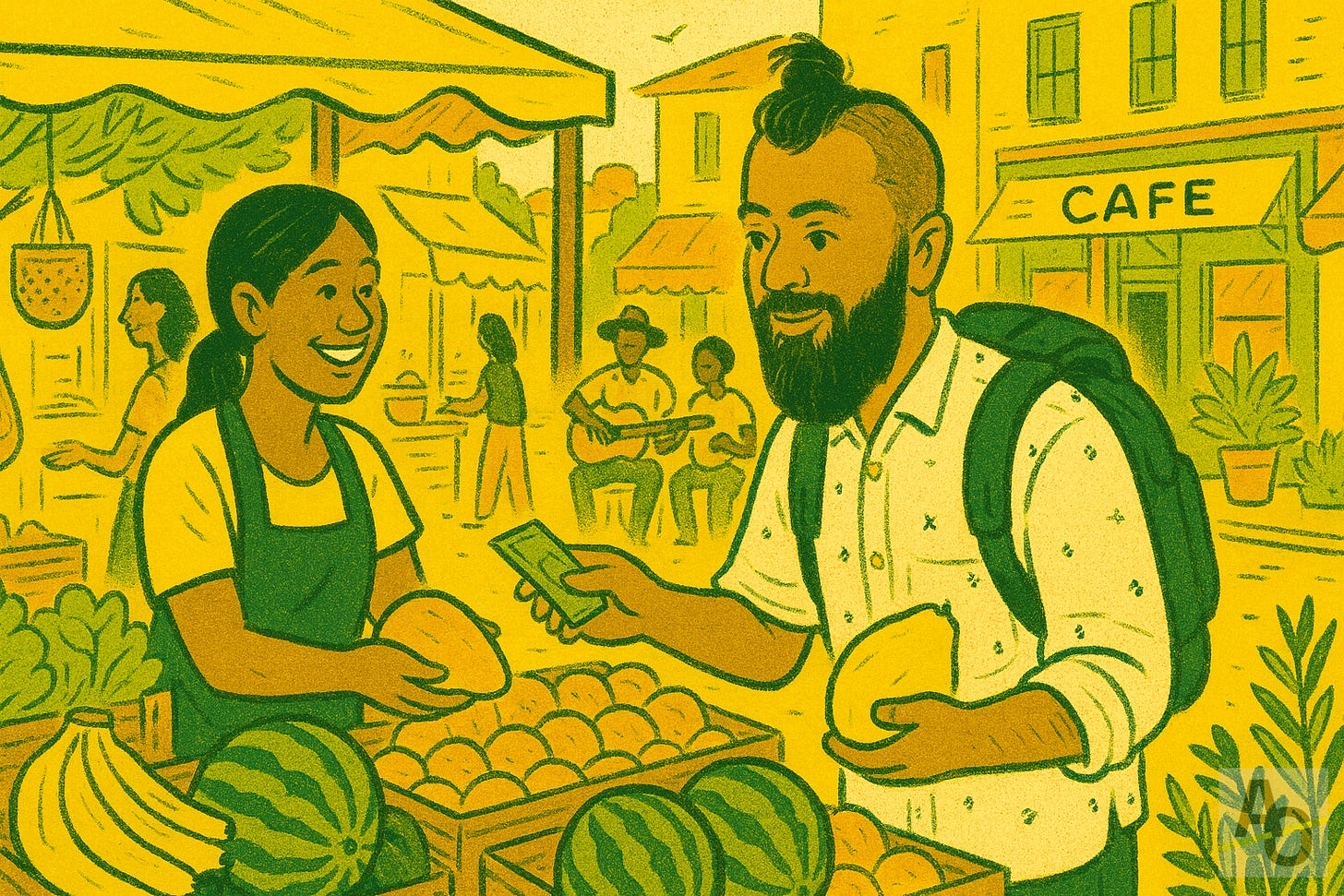Travel Global, Keep Your Spend Local
Simple habits and choices that keep your spend local; backing local ownership, fair wages, and community-led experiences.
By Kanishka S. for Atlas October
We travel, and money moves. The question is where it lands. My aim, and I hope yours, is simple: keep more of what we spend in the communities we visit—payments landing with local owners, workers earning dignified wages, value staying where it’s created.
60-30-10
To do that, let’s use a 60-30-10 rule. Sixty percent goes to businesses that are locally owned and paid directly; the family-run guesthouse, the co-op cafe, the guide you hire yourself. For this bucket, I mean supermajority local ownership (about 67%+ beneficial ownership held domestically, including community/Indigenous co-ops), with profits largely retained or reinvested locally. Thirty percent goes to locally operated options where payroll and taxes are in-country—even if the brand or some ownership is foreign: domestic carriers, regional hotel groups, franchisees that employ local teams and pay local VAT. The last ten percent is inevitable leakage—international flights, booking fees, global chains you can’t realistically avoid, roaming, imported odds and ends.
We can’t realistically audit corporate registries at the check-in desk. Instead, we can use a one-minute test: Who owns it? Who gets paid today? Where does the fee go? If the owner is in the room and you can pay them directly, that’s 60. If staff and taxes are local but profits may travel, that’s 30. If neither is true (or a visible fee jumps to an overseas headquarters) that’s 10. Good enough beats perfect; the point is direction, not purity.
And an important fairness note up front: pay fair local rates, take receipts when offered, and choose what’s safe and accessible for you and for workers. “Keeping spend local” isn’t an excuse to undercut, it's a way to fund livelihoods with dignity.
Here’s the Pocket Playbook—four scannable domains, no registry-deep homework, just habits that make money land with locals.
Stays
Book online, then shift direct. First night via a platform for convenience; extend by communicating with the property, or at the desk and pay the property directly.
Look for owner-operator signals. Named owners at check-in, family staff, local bank QR, handwritten/printed house rules, community notices.
Ask one clear question. “If I add two nights and pay you directly, is the rate the same?”
Choose local add-ons. Laundry, breakfast cafes, airport pickup; book through the property if they use local operators and you can pay them directly.
Read the scale. Micro hotels, homestays, co-ops, and guesthouses tend to be in the 60 bucket; international brands and big-box “resorts” usually fall into the 30.
Food & Drink
Eat where the owner is in the room. Market stalls, carinderias, family cafes, co-op kitchens; paper/board menus, daily dishes.
Move breakfast outside the hotel. It’s the simplest daily shift to 60.
Order what’s local. Fresh, seasonal dishes mean more local inputs and less leakage.
Pay simply. Cash or standard local e-wallet keeps more with small vendors; take receipts when offered.
Tip to local norms. Follow local practice; when appropriate, tip directly to staff.
Transport
Use local legs for short hops. Trikes/bikes/vans where safe and standard; for longer days, hire a licensed local driver-guide and pay them directly.
Ride-hailing reality. App rides are 30 (local driver, foreign platform), but they are often the safe option when you’re new to a place. If you want to nudge toward 60, arrange direct day hires off-app where it’s normal and lawful.
Scooters & cars. Rent from locally owned outfits; verify license/insurance; choose safer vehicles over marginal savings.
Air & rail. Domestic carriers are 30; shift ancillary spend (meals, transfers, snacks) toward local vendors at origin/destination.
Activities & Shopping
Hire local guides. Community guides, dive masters, trekking leaders; book at the local tour desk or by referral; pay them directly.
Choose community venues. City museums, cultural centers, national parks; entry fees typically stay in-country (30) and often fund local staff.
Buy from makers. Co-ops, workshop storefronts, market stalls where you can meet the artisan. Ask, “Did you make this?” or “Which co-op is this?”
Skip export gloss. Airport gift shops and global chain souvenirs are classic 10s.
Price with dignity. Pay fair local rates; bargaining is for optional extras, not a race to the bottom.
Ten-second scripts (weave it into your day)
Desk: “If I extend two nights and pay you directly, is the rate the same? I can do cash or local wallet.”
Guide: “Are you licensed with the park/city? I’d like to pay you directly and get a receipt.”
Cafe/market: “Do you take the local wallet; or cash is better for you?”
Shop: “Who made this piece? Is this from a local co-op?”
Every trip moves money. Where it lands can be in our control. Convenience makes it easy to let spend drift toward distant headquarters; taking responsibility (and doing a bit of planning) lets more of it stay with the people who host us.
Remember that simple habits can redirect value: book the next nights directly, eat outside the hotel, hire licensed local guides and drivers, pay on-site to local accounts, take receipts when offered. Small choices compound across a trip.
This isn’t a purity test. The 60-30-10 rule is direction, not doctrine; safety, accessibility, and time matter. What counts is the tilt: pay fair local rates, choose lawful, normal methods where you are, and aim your spend at local owners and workers whenever you can.
Travel global. Keep your spend local.



If you'd like to see an actual trip report, or a sample plan for a trip you'd like to take, leave a comment and we'll do our best to make it a future post!
All I really want anyone to take away from this is to travel mindfully. Spend your money mindfully. It may seem small, but the world needs more mindful actions, it makes more difference than you think.